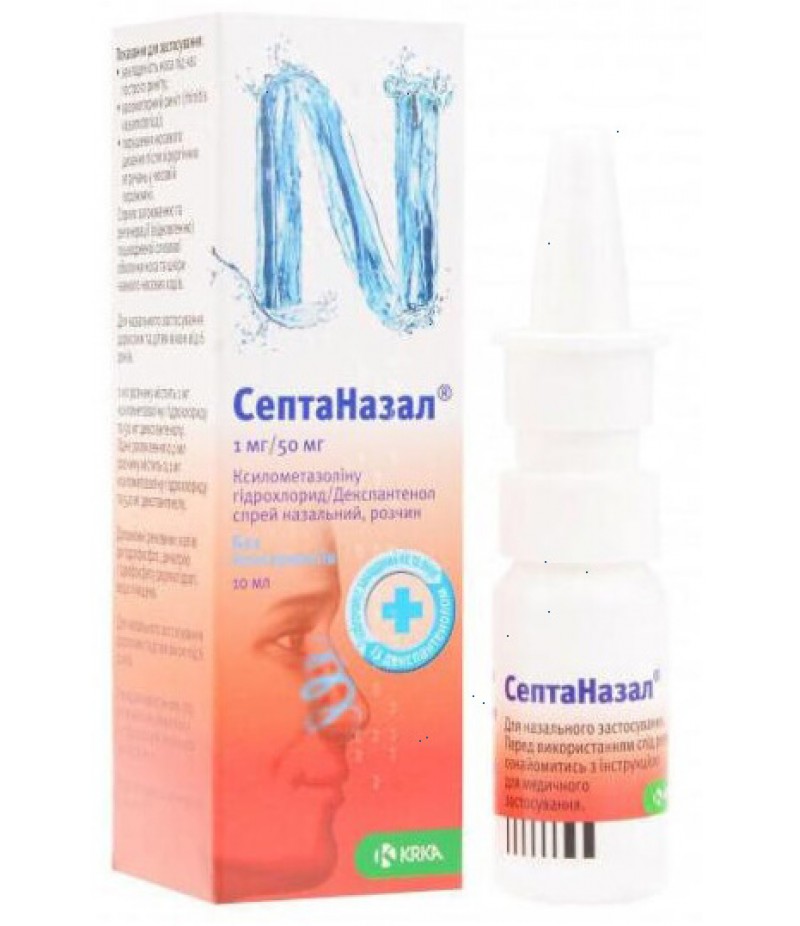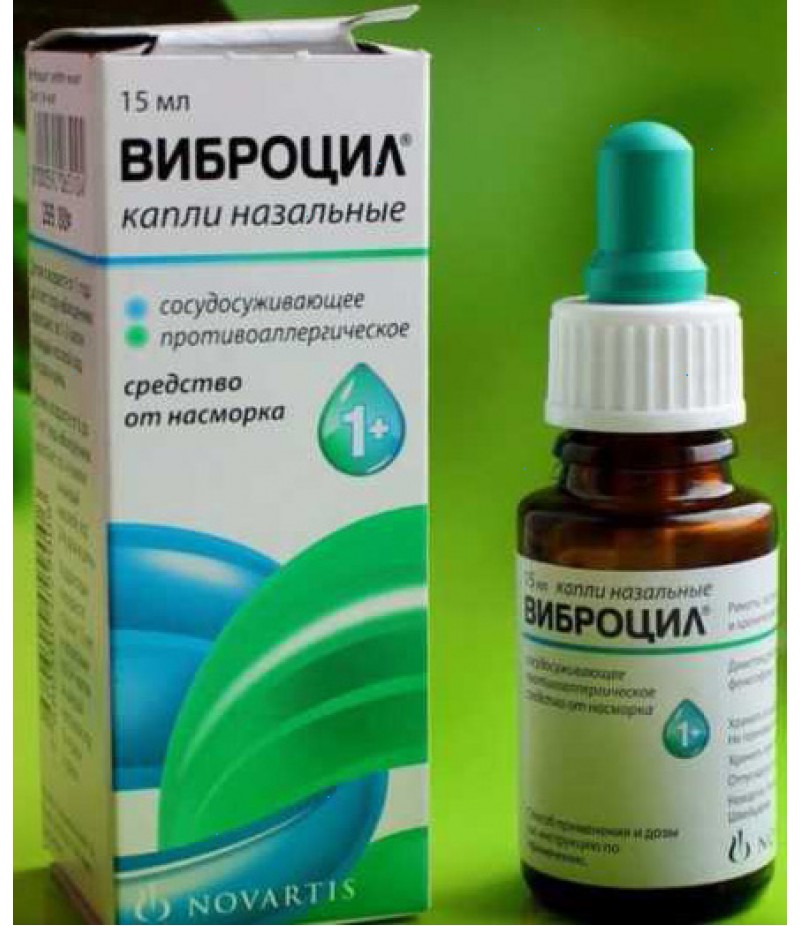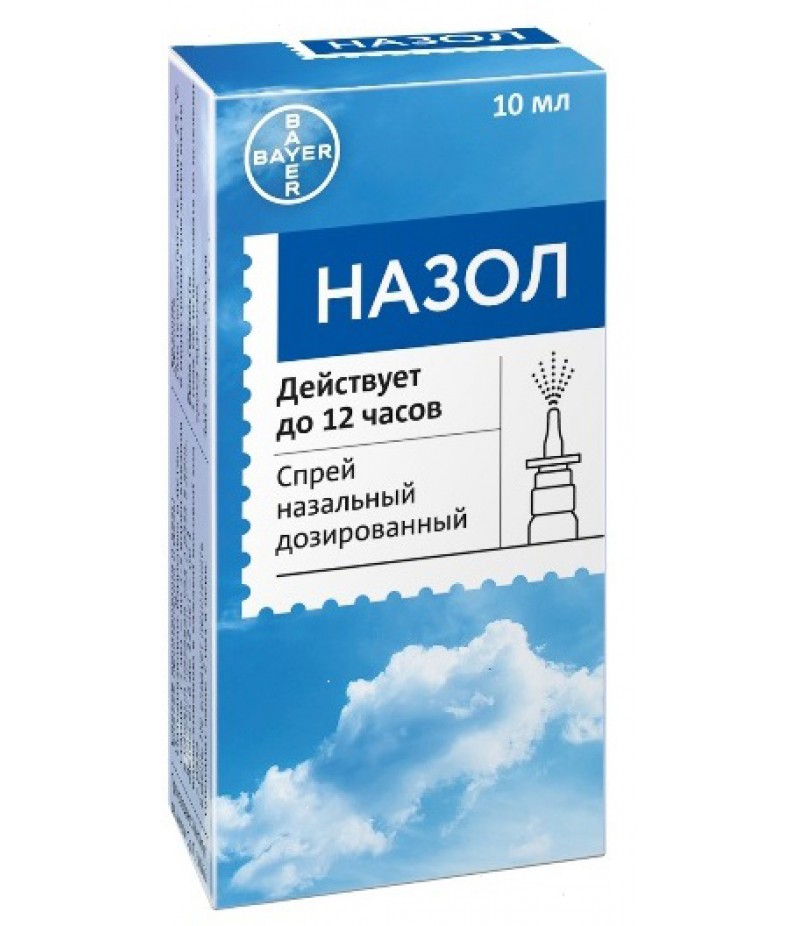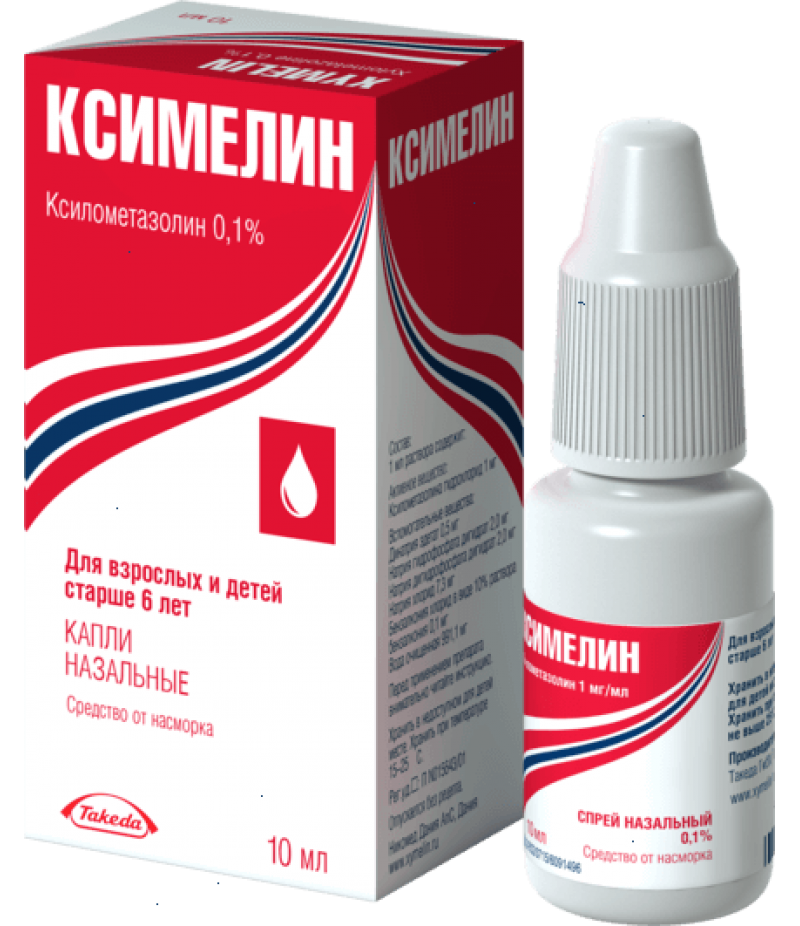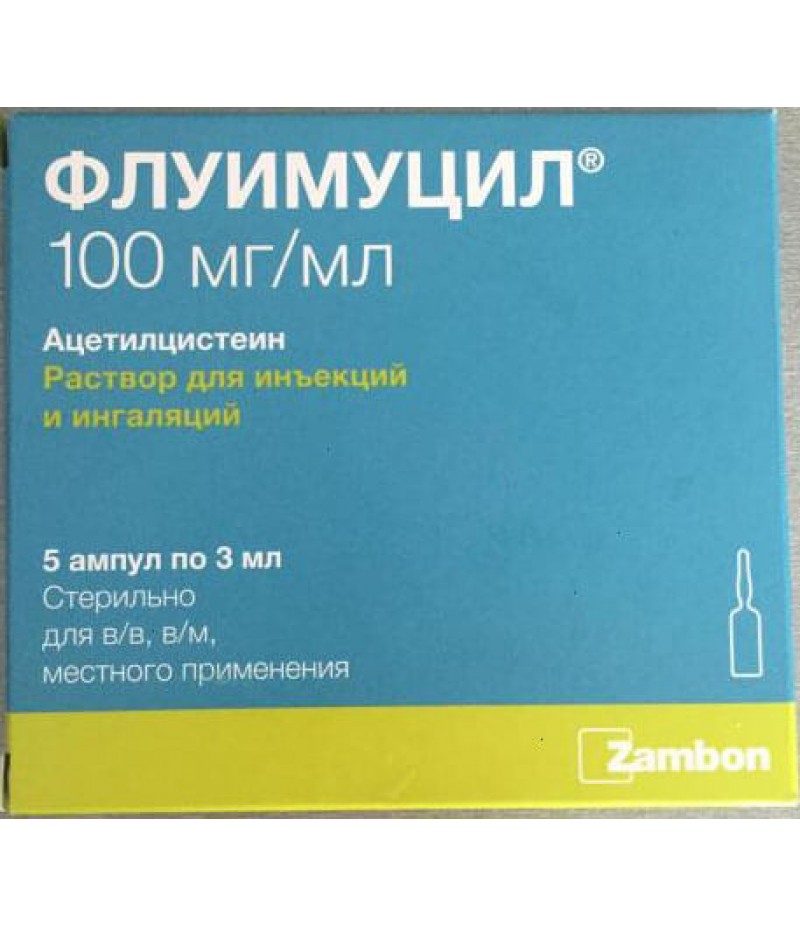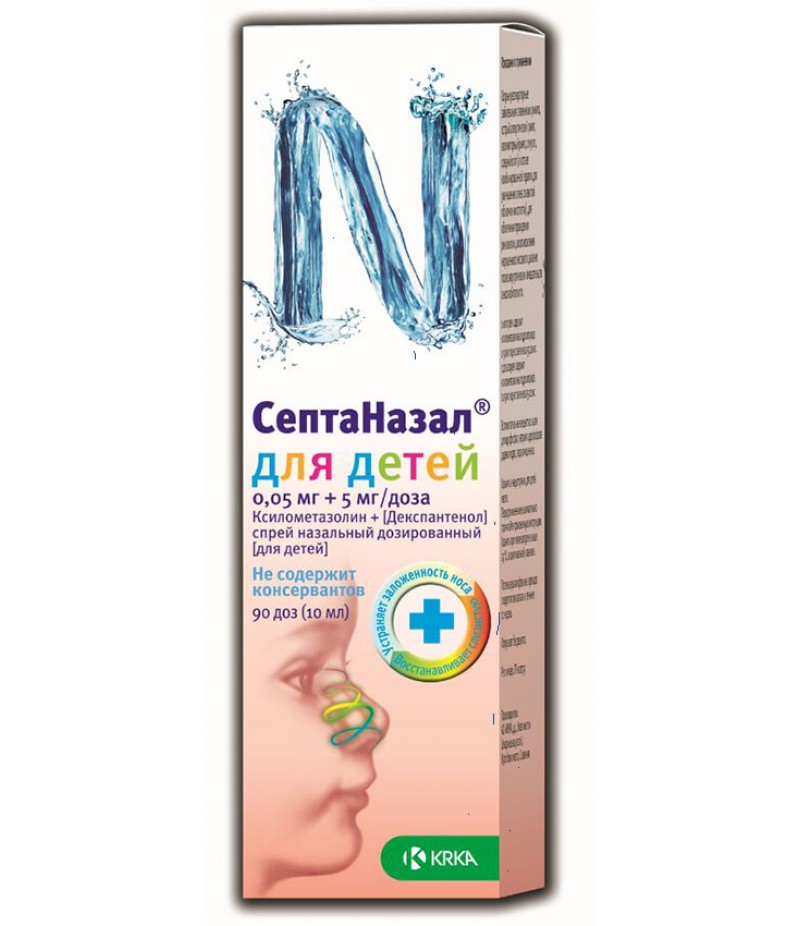Septanazal spray 0.1mg + 5mg/dose 90doses 10ml
- $11.39
- 3 or more $11.25
- Availability:In Stock
Septanazal instruction for useTo buy Septanazal just add it to your shopping cartSeptanazal - spray nasal spray for children and adults, rhinological preparation, which is a combination of alpha-sympa
Tags: spray
Septanazal instruction for use
To buy Septanazal just add it to your shopping cart
Septanazal - spray nasal spray for children and adults, rhinological preparation, which is a combination of alpha-sympathomimetics with a vitamin analog for topical application to the nasal mucosa. Xylometazoline has a vasoconstrictive effect, which removes the swelling of the mucous membrane. Dexpanthenol is a derivative of pantothenic acid - a vitamin, promotes wound healing and protects mucous membranes
Xylometazoline hydrochloride, an imidazole derivative, is an alpha-adrenergic sympathomimetic. It has a vasoconstrictive effect, which removes the swelling of the mucous membrane. The onset of action usually occurs in 5 to 10 minutes, its manifestation is the relief of nasal breathing due to the elimination of edema and improved discharge of secretions
Dexpanthenol (D - (+) - pantothenyl alcohol) is an alcohol analogue of pantothenic acid and, due to intermediate conversion, has the same biological activity as pantothenic acid. Biologically active is only D-panthenol (dexpanthenol). Pantothenic acid and its salts are water-soluble vitamins, which, like coenzyme A, participate in many metabolic processes, including assistance in the synthesis of proteins and corticoids, and in the production of antibodies. Coenzyme A also participates in the formation of lipids, which include the secretion of sebaceous glands, has an important protective function, and plays a role in the acetylation of amino sugars, which are the main building material for various mucopolysaccharides. Dexpanthenol has protective properties of the epithelium and promotes healing of wounds.
Pharmacokinetics
Data of pharmacokinetic studies of the use of xylometazoline hydrochloride in humans are absent. In some cases, with intranasal administration, the absorbed amount of xylometazoline hydrochloride can cause systemic effects on the central nervous system and the cardiovascular system.
Dexpanthenol is absorbed by the skin and is enzymatically oxidized in the body, as well as on the skin, into pantothenic acid.
Vitamin is transported in the form of binding proteins in blood plasma. Pantothenic acid is involved as a key component of coenzyme A, which is formed throughout the body.
There are no more detailed studies of metabolism on the skin and mucous membranes. 60 - 70% of the orally received dose of dexpanthenol is excreted in the urine, 30-40% by feces.
Indications for use
Septanazal for adults and Septanazal for children are shown:
- to reduce the edema of the nasal mucosa with rhinitis and as a maintenance therapy for healing the damage to the nasal mucosa,
- to alleviate the symptoms of vasomotor rhinitis,
- for the treatment of nasal breathing disorders after surgical interventions in the nasal cavity.
Mode of application
The usual dose of the drug Septanazal for adults is one injection into each nostril up to 3 times a day, as needed. Dosage depends on individual sensitivity to the drug and clinical effectiveness. The duration of treatment is not more than 7 days. Repeated use is possible only after a break of several days.
In children under the age of 12, the drug should be administered under the supervision of adults. If, after 3 days of treatment, there is no improvement or a worsening of symptoms, the clinical should be reviewed.
The usual dose of Septanazal for adults in children aged 6 years and older is one injection in each nostril up to 3 times a day. Concerning the duration of treatment in children, it is always necessary to consult a doctor. The use of the drug Septanazal for adults is contraindicated in children under 6 years of age.
The usual dose of Septanazal for children in children aged 2 to 6 years is one injection into each nostril up to 3 times a day. Concerning the duration of treatment in children, it is always necessary to consult a doctor.
The use of the drug Septanazal for children is contraindicated in children under 2 years of age.
First remove the protective cover from the spray gun. Before the first use, or if the spray has not been used for a long period of time, several times the spray head must be pressed until fine droplets appear.
The tip of the nebulizer should be inserted, if possible, vertically into one nostril and once pressed on the head of the nebulizer. The patient should gently breathe through the nose during spraying. If necessary, repeat the procedure for another nostril.
After each use, the nozzle tip should be cleaned with a paper towel and the back cover back on the spray gun.
Side effects of Septanazal
Infrequently (≥ 1 / 1,000, up to <1/100): hypersensitivity reactions (Quincke's edema, skin rash, itching).
Rarely (≥ 1 / 10,000, up to <1 / 1,000): tachycardia, hypertension.
Very rarely (<1 / 10,000): anxiety, insomnia, fatigue (drowsiness, sedation), headache, hallucinations (especially in children), arrhythmia, re-congestion, epistaxis, seizures (especially in children).
It is not known (can not be estimated from the available data): burning or dryness of the nasal mucosa, sneezing.
Contraindications
Hypersensitivity to the active ingredients or other components of the drug, dry rhinitis (rhinitis sicca), transsphenoidal hypophysectomy in history, or other surgical interventions affecting the dura mater.
Septanazal for adults is contraindicated in children under 6 years.
Septanazal for children is contraindicated in children under 2 years.
Pregnancy
Septanazal for adults / Septanazal for children should not be used during pregnancy, since there are no sufficient data on the use of xylometazoline hydrochloride by pregnant women.
Septanazal for adults / Septanazal for children should not be used during lactation, because it is not known whether xylometazoline hydrochloride is excreted in breast milk.
Interaction with other drugs
The simultaneous use of Septanazal for adults / Septanazal for children with monoamine oxidase inhibitors such as tranylcypromine or tricyclic antidepressants and drugs that increase blood pressure may lead to an increase in blood pressure due to the effect of these active substances on the cardiovascular system
Simultaneous use of the drug with drugs for local or systemic treatment of influenza and cold and cough preparations containing sympathomimetics (eg pseudoephedrine, ephedrine, phenylephrine, oxymetazoline, xylometazoline, tramazolin, naphazoline, tuamine heptane) may cause additional effects on the cardiovascular system and the central nervous system
Data on the interaction of dexpanthenol with other drugs are absent.
Overdose
The clinical picture of intoxication with imidazole derivatives can be diverse, since the phases of stimulation can alternate with periods of central nervous system and cardiovascular suppression
Symptoms: convulsions and coma, bradycardia, apnea, arterial hypertension, as well as arterial hypotension, anxiety, excited state, hallucinations, lowered body temperature, fatigue, drowsiness, miosis, mydriasis, sweating, fever, pallor, cyanosis, nausea, tachycardia, bradycardia , cardiac arrhythmia, cardiac arrest, arterial hypertension, shock-like hypotension, pulmonary edema, respiratory disorders and apnea.
Treatment: in cases of severe overdose, intensive inpatient treatment is indicated. The purpose of activated carbon (adsorbent), sodium sulfate (laxative) or gastric lavage (in the case of large quantities) should be done immediately, as xylometazoline is rapidly absorbed. To reduce blood pressure, you can appoint a non-selective antagonist of alpha-adrenergic receptors. Vasopressor agents are contraindicated. If necessary, lower body temperature, anticonvulsant therapy and oxygen inhalation.
Storage conditions
Store at a temperature not exceeding 25 ° C. Keep out of the reach of children!
Form of issue
Nasal spray 0.5 mg / 50 mg, 10 ml. Nasal Spray 1 mg / 50 mg, 10 ml
For 10 ml of the drug is placed in plastic bottles with a spray valve and a protective cap.
1 bottle in a pack.
Composition
1 ml of the preparation contains:
Septanazal for children xylometazoline hydrochloride 0.5 mg, dexpanthenol 50 mg.
Septanazal for adults xylometazoline hydrochloride 1 mg, dexpanthenol 50 mg.
Excipients: potassium dihydrogen phosphate, disodium phosphate dodecahydrate, purified water.
Additionally
This drug can be used with caution only after a thorough assessment of risks and benefits in the following cases: patients are treated with monoamine oxidase (MAO) inhibitors and other drugs that potentially increase blood pressure, increased intraocular pressure, especially occlusive glaucoma, serious cardiovascular diseases eg, ischemic heart disease, hypertension), pheochromocytoma, metabolic disorders (eg, hyperthyroidism, diabetes mellitus), porphyria, prostatic hyperplasia.
Before use, clean the nasal passages. With chronic rhinitis, the drug can be used only under the supervision of a doctor due to the danger of atrophy of the nasal mucosa.
Long-term use and overdose of sympathomimetic decongestants can lead to reactive hyperemia of the nasal mucosa. This side effect can lead to airway obstruction, which in turn forces the patient to repeatedly or even constantly apply the drug. This can cause chronic edema (drug rhinitis) or even atrophy of the nasal mucosa.
In non-urgent cases, it is possible to stop the introduction of a sympathomimetic drug into one nostril, and when the complication decreases, continue the treatment by insertion into another nostril in order to maintain, at least in part, nasal breathing.
Avoid contact with the eye. In case of incorrect application or application of excessive amounts of spray, xylometazoline absorption can cause systemic side effects, especially in children (cardiovascular and neurological side effects).
The simultaneous use of the drug with drugs for local or systemic treatment of influenza and cold and cough preparations containing sympathomimetics (eg pseudoephedrine, ephedrine, phenylephrine, oxymetazoline, xylometazoline, tramazolin, naphazoline, tuamine heptane) is not recommended to avoid an increased risk of developing cardio -Vascular and neurological side effects.
Each package should use only one person to avoid infection.
Terms of sell
To buy Septanazal the prescription is not required.

